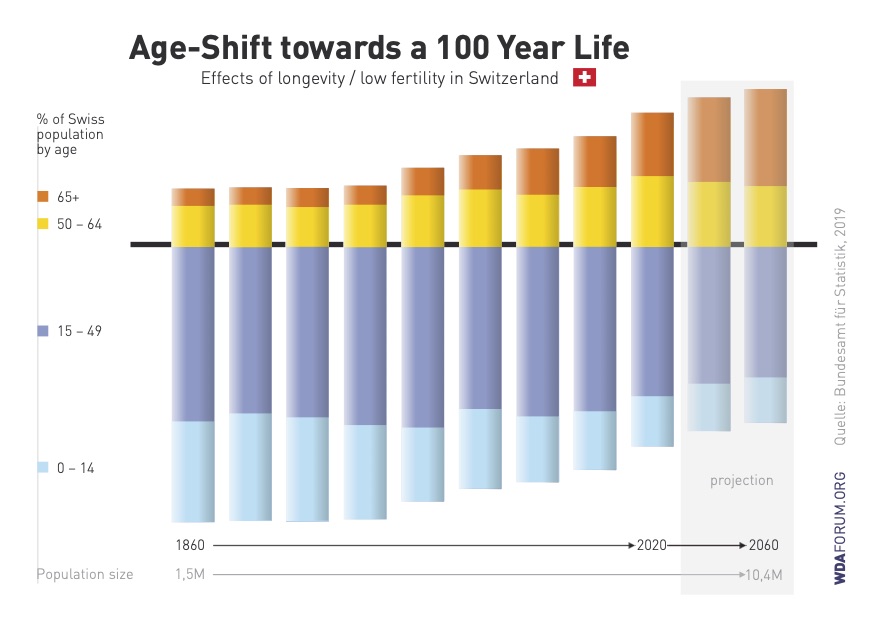WDA Communication Platform: Views from Generation Y
Demography is more than just statistical analysis and projections of population sizes, fertility levels, life expectancies and migration patterns. Demographic factors are forces that shape nations as well as entire continents, with respect to their societal, economic, environmental and political development.
Surprisingly, these important discussions are mainly conducted by people from the «post-war» generation (born 1940–1955) and the «baby boom» generation (born 1956–1970). But both of these groups are increasingly becoming «observers» when it comes to shaping the future of planet Earth.
Generation Y (born 1985–2000), those currently aged 20–35 years old, are the children of the baby boomers. They are about to finish their education or are just starting their professional career. Generation Y is the first generation who grew up entirely with modern IT technology like the internet, smartphones and the like. They have been shaped and driven by these innovations, but it is notable, too, that they have received more support from their parents than have any generation before them. But why are they called «generation Y» and what do they stand for?
«Y» stands for «why»!
There is a vast amount of literature on how to characterize this generation and it is worth making oneself familiar with these findings. Generation Y seems to have a very self-centered life approach with more «me time» and flexibility at work. Demand for feedback and advice, and for what aligns best with their needs, are other features. They are apolitical only at first glance. Any activity is pursued with a clear strategy and a focus on a cost–benefit analysis that is less likely to be derailed by ideologic principles. Their complex credo is: education, job, family, social life – these must all be harmonized and fulfill each individual’s needs and preferences.
Since generation Y will become our future leaders the WDA Forum is launching a new communication platform: «Views from Generation Y».
Demography is a topic that concerns all generations. From February 2020 we will publish in 2-monthly intervals position papers about demographic change written by master’s students from the University of St. Gallen. The opinions expressed in these papers, and any remaining errors, are the authors’ alone.
It is our wish that these views inspire discussion across generations.
Dr. med. Hans Groth
Chairman of the Board WDA Forum
Dr. oec. publ. Martin Dahinden
Member of the Board WDA Forum
Views from Generation Y - Position Papers
«Auswirkungen des demographischen Wandels auf die Aktienmärkte»
Autor: Robin Erbas
Robin Erbas, Bachelorstudent an der University of Applied Sciences der Deutschen Bundesbank, hat sich im Rahmen eines Forschungspraktikums beim WDA Forum mit dem Thema «Financial Demography» befasst.
Seine zwei Kernaussagen lauten:
- «Der demografische Wandel wird mit seinen prägenden Faktoren, nämlich sinkenden Geburtenraten und höheren Lebenserwartungen, erhebliche Auswirkungen auf die globalen Aktienmärkte haben.»
- «Um von den Auswirkungen der demografischen Entwicklungen auf die Aktienmärkte zu profitieren, sollten Anleger eine weltweite Diversifikation anstreben und bei der Portfoliozusammensetzung eine umfassendere Betrachtung potenzieller Profiteure langfristiger demografischer Entwicklungen berücksichtigen.»
Newsletter - August 2023 (Geman only)
WDA Lehrauftrag zum Thema «Demografie: Instrument mit Potenzial für Politik und Wirtschaft».
Die nachfolgenden Arbeiten wurden im Wintersemester 2022 von Studierenden des Masterstudiengangs Internationale Beziehungen an der Andràssy Universität in Budapest verfasst.
- Der Umgang Ungarns mit seiner Demografie
«Demografische Entwicklungen in Ungarn bis 2035»
Adél Virág Gogolák - Arbeitskräfte aus den afrikanischen Ländern als Lösung für Europa
«Eine afrikanisch – europäische Arbeitsunion zur Lösung der demografischen Negativentwicklung»
Katharina Dammüller - Wege für Zukunft und Wachstum auf dem Westbalkan
«Demographischer Wandel in Osteuropa: Diaspora-Strategien des Westbalkans»
Marit Spies - Humankapital in Russland nach dem Krieg
«Auswirkungen des Ukraine-Krieges auf das Humankapital und den Arbeitsmarkt in Russland»
Charlotte Schweers - Deutschland muss für ausländische Fachkräfte attraktiver werden
«Deutschland aus Sicht ausländischer Fachkräfte» Pauline Kielbassa - Zuwanderung: eine komplexe Herausforderung mit vielen Facetten
«Fachkräftemangel aufgrund des demografischen Wandels - Gesteuerte Zuwanderung zur Stärkung des Arbeitsmarktes?»
Carolin Weinheimer
Newsletter - April 2022 (Geman only)
Drei Seminararbeiten wurden von Studierenden des Masterstudiengangs Internationale Beziehungen an der Andràssy Universität in Budapest verfasst. Seit Herbst 2021 haben Martin Dahinden und Hans Groth dort einen Lehrauftrag zum Thema Demografie: Instrument mit Potenzial für Politik und Wirtschaft.
- Demografie-Massnahmen der neuen Koalitionsparteien in Deutschland
Sophie Kühn - Urbanisierung und ihre «Leuchtturm-Demografie» am Beispiel Ungarns
Niklas Mitttelstädt - Auswirkungen auf die Arbeitsproduktivität und ihre Folgen auf den technologischen Fortschritt in alternden Industriestaaten
Friedrich-Philipp Wazinski
Newsletter - April 2021 (German only)

Im Baugewerbe werden Arbeitskräfte seit knapp zwei Jahrzehnten mit 60 Jahren frühpensioniert. Wieso ist das so und wie zukunftstauglich ist dieses Arbeitsmodell?
«Die Arbeitsfähigkeit und -bereitschaft von älteren Arbeitskräften im Bauhauptgewerbe fördern»
Einschätzungen über Möglichkeiten und Grenzen von Arbeitnehmenden und Arbeitgebern
Die Bachelorarbeit von Milena Meier gibt dazu Antworten und zeigt Impulse zum Handeln!
Unsere Erwerbsbiografien, dh. wie lange, wie und was wir arbeiten, werden durch ein imer längeres Leben zunehmend herausgefordert. Die Finanzierung der Altersvorsorge zeigt, dass wir Antworten nicht länger aufschieben können.

Zahlen und Fakten zum demografischen Wandel in der Schweiz:
- Die Lebenserwartung beträgt derzeit für Frauen 85,6 Jahre, für Männer 81,9 Jahre.
- Seit mehr als 160 Jahren steigt die Lebenserwartung um ca. 2 Monate/Jahr. Wie bei der Spanischen Grippe vor 100 Jahren wird auch die COVID-19 Pandemie wird diesen Trend nicht brechen.
- Anhaltend tiefe Geburtenraten, ein zunehmend längeres Leben werden uns - trotz Migration - sichtbar älter machen, obgleich die Wohnbevölkerung von derzeit 8,6 Millionen bis 2040 auf 9,5 Millionen zunehmen wird. (Basis: niedriges Szenario C-00-2020 des BfS).
- Ab 2025 wird die Erwerbsbevölkerung sinken.
- Die Anzahl der Personen über 65 wird in den nächsten 20 Jahren um 750'000 steigen; ihr Anteil an der Gesamtbevölkerung wird von 18% auf 24% zunehmen.
- Der Anteil der 80+-Jährigen wird sich bis 2050 verdoppeln.
- Der AHV-Lohnbeitrag müsste in den nächsten 20 Jahren um 50% ansteigen und sich in 40 Jahren sogar verdoppeln, um das aktuelle Rentenniveau beibehalten zu können.
Newsletter – January 2021
This edition addresses the role of technology in overcoming some of the downsides of longevity, or how to make longevity a sustainable achievement across generations?
The papers written by Luiz Fernando De Arruda, Sandro Leugger and Leon Marburger:
- describe economic and social challenges associated with ageing and shrinking societies
- discuss how potentially insufficient productivity, unsustainable healthcare provision, social isolation and declining mobility can be overcome with innovative technologies that become part of our future daily life.
To make longevity a success requires change and transition, but also:
- leaps in technology
- an openness to adopt technology in our life
- broad access across societies to the latest technology
Does Technology Contribute Towards Making Longevity a Sustainable Achievement?
The Cases of Productivity and Healthcare
Luiz Fernando De Arruda
Download paper
The Race between Technology and an Ageing Population
Sandro Leugger
Download paper
How Can Technology Help Make Longevity a Sustainable Achievement?
Leon Maximilian Marburger
Download paper
Newsletter – June 2020
This issue addresses «Political Demography». The topic embraces political science and demography and subsequently demonstrates how powerful demographic variables are in shaping political processes on an international, regional and national level.
The master student Philippe Hachen gives a well-written introduction and overview of key academic theories on political demography. He provides us with examples on an international, national and even subnational level. Today’s demographic challenges are increasingly linked in numerous layers in the realms of business, society and policy. In order to tackle the challenges successfully we require goals that align with each other and thus can be achieved collectively. A quote from political demography thought leader Jack Goldstone (2012) could not better summarize why we need to pay more attention to this academic field:
«We need to understand how these forces operate, if we are to take control of our destiny and shape it».
Political Demography:
In order to understand the world, one can start by studying demography
Philippe Hachem
Download paper
Newsletter – April 2020
The master students Ziqian Feng and Oliver Kilchenmann have analyzed the development strategies in Africa. They compared the approaches of China, the US and Switzerland. There is no doubt: the differences in approach and the vision behind are considerable!
Development Strategy in Sub-Saharian Africa:
A comparison of the Chinese, US and Swiss Approaches
Ziqian Feng
Download paper
The Fundamental Differences in Development Strategies in Africa:
A comparison of the US, Chinese and Swiss Approaches
Oliver Kilchenmann
Download paper
Newsletter – March 2020
The master students Patrick Friedli and Lucas Binggeli share their views on what changes we can expect to see, how we will tackle them, and under which conditions generation Y might retire in 2060 or later.
Demographic change in Switzerland: How might it be in 2060?
Lucas Binggeli
Download paper
Our life courses: What will change? How might it be in Switzerland in 2060?
Patrick Friedli
Download paper


